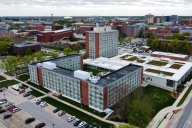You have /5 articles left.
Sign up for a free account or log in.
Sixteen Columbia University students who protested and disrupted a campus speaker earlier this month are under investigation for violating the university’s code of conduct. The investigations represent one of the first examples this academic year of a university seriously considering disciplining students for disrupting a speaker, though high-profile protests at Middlebury College and Claremont McKenna College were followed by punishments last year.
The university's actions are not being universally applauded, however. In response to the investigation, more than 100 professors signed a letter to President Lee Bollinger saying that the university is applying its rules on free speech in a “discriminatory and arbitrary” way. The letter noted that a majority of the students being investigated are students of color and questioned the university’s motives and approach. It did not dispute that the students disrupted the speech, though it argued that no rules were broken.
Earlier in October, Tommy Robinson, an anti-Islam activist from Britain, was slated to speak via video chat at a Columbia College Republicans event open to anyone with a Columbia ID. Protesters both shouted him down at times and peppered him with questions, engaging in a question-and-answer session instead of allowing him to deliver an address. There were also instances of students attempting to unplug the video and audio equipment.
Although they altered the event from what it was originally slated to be, protesters under investigation are arguing that their back-and-forth with Robinson -- whose real name is Christopher Yaxley-Lennon -- constituted a dialogue, and that they were within their rights as Columbia students to participate in a discussion with Robinson. While students did engage in a question-and-answer session with Robinson, the narratives laid out by the university and the campus newspaper involve 30 protesters, some of whom chanted and shouted through some of Robinson’s answers and interrupted other students’ questions. Other protesters banged on the doors to the auditorium where the event was held.
Kayum Ahmed, a doctoral candidate and one of the protesters under investigation, said in an interview Monday afternoon that the university was twisting and exaggerating the protesters’ actions, and highlighted some of the more tame protesters, such as those who held signs peacefully, without blocking the screen on which Robinson appeared. A video posted by the Columbia College Republicans’ Facebook page shows a College Republicans member seeming to shrug off the protesters with signs, which protesters argue was tacit approval.
“Whatever actions we took could be characterized as actions in the name of free speech,” Ahmed said.
In a statement released Monday by 19 of the protesters, they said they were acknowledged by the Columbia College Republicans members present, who did indeed let the event continue. The protesters also said that they had been banned from further Columbia College Republicans events, which they said was a disregard for due process, since the investigations are still ongoing.
We would therefore characterize our participation in terms of the rules as a “clash of opinions” that “tested” the ideas expressed by Robinson “so that members of the university community can listen, challenge each other and be challenged in return.” We were undertaking a “truth-seeking function” through our participation in and challenging of the facts underlying the speakers’ statements. We were thereby contributing to a culture of debate that embraced “a nimble cast of mind” where participants were “able to grasp multiple perspectives and the full complexity of the subject” as articulated in the rules.
The protesters also argued that by allowing the speaking event to take place, Columbia was violating its own principles.
At the same time, it is important to note that “the university may restrict expression that constitutes a genuine threat of harassment …” We believe that the invitations issued to white supremacists by the College Republicans constitute “a genuine threat of harassment” to marginalized groups on campus and that this threat should be investigated by the university.
The professors who signed the letter to Bollinger held similar sentiments to the students being investigated. The letter calls the investigation an overreaction and questioned the legitimacy of banning students from College Republican events before reaching a disciplinary conclusion. They argued that the university was playing into the hands of white supremacists by allowing speakers on campus without regard for their views and then punishing students who protest them.
“The overreaction of the university to student protest through the aggressive and discriminatory and arbitrary enforcement of the rules of university conduct signals the institution’s capitulation to a concerted strategy by the opponents of the very idea of the university,” the letter reads. “Their game plan is to flood educational institutions with inflammatory speakers and lure the university into issuing statements defending their right to speak, despite -- or especially because of -- their offensive ideas. It will then be left to students to protest the ideology of these speakers, at which point the university will prosecute the students for violating the institution’s rules of conduct.”
The Columbia College Republicans have pushed back on the narratives presented by the protesters and the professors who signed the letter.
Speaking on Fox News, Aristotle Boosalis, president of the organization, that the protesters clearly broke the rules, and the disruptions to the event amounted to a silencing of the College Republicans, rather than a discussion.
"We must protect freedom of speech for both sides," Boosalis said. "But if one side was not willing to let the other speak, then we have a problem here."
Boosalis also brought up an instance of fliers being posted around campus with his face on them, urging passersby to "let him know what you think" about the group inviting another controversial speaker, far-right writer Mike Cernovich, to campus.
Regarding the Robinson protests, university administrators argued that the college shouldn’t be in the position of policing views on campus. Even though Columbia is private, and not bound by the First Amendment, policing speakers could set a dangerous precedent, the university argued. (Indeed, colleges in the United States have their own history in the mid-20th century with purging communists and leftists -- the same categories that some of today’s protesters identify with -- from campuses by administering loyalty oaths.)
In an email sent to Columbia students sent before Robinson’s speech, Suzanne B. Goldberg, executive vice president for university life, said it is “foundational to Columbia’s learning and teaching missions that we allow for the contestation of ideas.”
The university reiterated its message on an FAQ page posted ahead the Cernovich event, which was slated for Monday night.
The university allows student organizations to invite speakers to campus, even when those speakers’ ideas are deeply offensive and objectionable. The university’s commitment to free expression, open debate and the testing of ideas means that no message will be ruled out on the ground that it is untrue, offensive or contrary to our values.
The Cernovich event was met with protesters both inside and outside the room reserved for the meeting, though the Columbia Spectator reported the protesters inside the room were mostly silent.
Robinson bills himself as anti-extremist, but he has been affiliated with various anti-Islam activist groups over the years, and called the Quran “a violent and cursed book” on Good Morning Britain over the summer. Currently, he’s a contributor to The Rebel, a conservative media outlet.
Answering questions from protesters during the event earlier this month, Robinson alleged there were only 50 Nazis in Britain, while there were “23,000 Muslims on the terror watch list.” The 23,000 number appears to have come from the number of people designated as “subjects of interest” at some time by anti-terrorism authorities in the U.K., although the range of time that number covers, as well as the religious affiliations of those people, are not clear.
Statements like that, as well as Robinson’s comments on the Quran, are what critics of Robinson have latched onto, saying he often conflates terrorism and extremism with the Muslim religion at large.
The nature of speakers like Robinson raises questions about the traditional interpretation of free speech, both Ahmed and the professors who signed the letter concurred. Ignoring the context of Robinson’s views and allowing him to speak is a form of ignoring larger inequalities in the world, they both separately argued.
“Certain voices, with power, with money, are given far greater spaces than those without … the invitations by College Republicans to white supremacist, alt-right speakers seemed to play into this neutral liberal space that the university was attempting to create,” said Ahmed, an international student from South Africa who lived under apartheid for 18 years. “The free-speech provisions in the First Amendment were being appropriated by the College Republicans and used as a proxy for perpetuating various forms of hate speech and violence.”
Representatives from the Columbia College Republicans did not respond to requests for comment. A Columbia spokeswoman previously told Inside Higher Ed, after the initial protests against Robinson, that any disciplinary actions, if applied, would be confidential. The university did not respond to requests for comment regarding the protesters’ allegations that allowing Robinson to speak was a violation.
The Beginning of Punishing Protesters?
The news from Columbia comes as colleges across the country have been grappling with how to deal with protests that disrupt or shut down events. Often, colleges have remained mum on how they have or haven’t disciplined students, citing student-privacy rules.
At the same time, moves to punish protesters have proved controversial, putting many institutions in a bind. Earlier this month the University of Wisconsin system Board of Regents voted into place a set of punishments for protesters who repeatedly disrupt university events, with suspension and expulsion on the table. The policy mirrors Republican legislation that has stalled in the statehouse, and opponents of the measure said it would chill free speech itself and overstep the First Amendment rights of protesters by being too vaguely written.
Some protesters, however, have started to argue that controversial campus speakers are crossing the line of traditionally protected speech. At a Senate hearing last week, Senators Tim Kaine and Maggie Hassan, both Democrats, diverged from what was otherwise a bipartisan consensus on vigorously defending free speech at college campuses when they questioned whether some speakers pose a threat.
“Colleges should be a place of robust speech and disagreement. We don’t need to protect people from free speech; we need to expose them to different ideas and have them use their critical faculties to determine what is right and wrong,” Kaine said. “But, I think, we cannot use the banner of protecting free speech to allow people to terrorize folks.”
Hassan pointed to two recently filed lawsuits seeking to hold outspoken white supremacist Richard Spencer and organizers of the “Unite the Right” rally accountable for the violence that occurred when white nationalists gathered in Charlottesville, Va., in August, ostensibly to protest the proposed removal of Confederate statues. In addition to protesters shouting racist and anti-Semitic chants, a man drove his car through a crowd of counterprotesters, killing a woman, and plaintiffs say the organizers saw the violence coming during the planning stages. Hassan also brought up the three Spencer supporters arrested for attempted murder after Spencer’s Oct. 19 University of Florida speech.
In response, Richard Cohen, president of the Southern Poverty Law Center and a witness at the hearing, told the committee that the bar for free speech crossing a line and becoming an unprotected incitement of violence is very high.
“I think it would be difficult, perhaps, to prove some of the allegations [in the Charlottesville lawsuit], to be honest,” Cohen said. “Clearly, incitement has a very precise legal meaning under the Constitution … There could be evidence of that. Bravado in advance [is] probably not enough. Celebrating someone’s demise in an ugly way, clearly not enough.”
Still, the idea of speakers bringing violence is one that has caught on with protesters, especially those who take their picketing from the sidewalks into the events that they shut down. The confidence in defeating hate speech with opposing speech, espoused by the majority of senators at the hearing, is not universally agreed upon on campuses.
“The very presence of white supremacists on campus makes me fear for my personal safety and that of my colleagues and friends. These concerns are particularly relevant given the violence associated with white supremacist events across the United States,” the Columbia protesters said in their statement. “It is the university’s position that hate speech should be countered with equally opposing views so that the student community can decide for themselves what they want to believe. While this neutral approach may seem reasonable, the university ignores the fact that not all voices have equal power and that opposing voices are not equally heard.”








